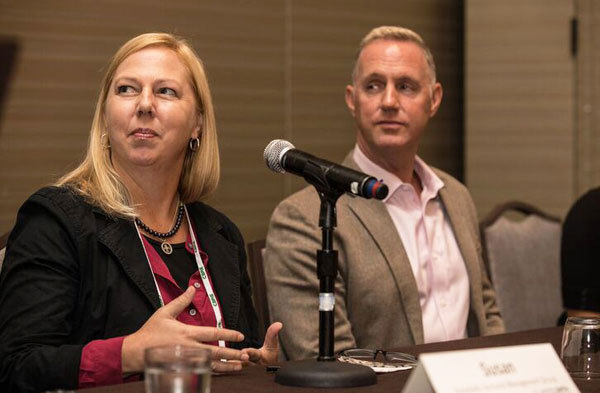✕

Column: industry Tag: OTAs,direct channels,distribution Published: 2017-09-08 10:48 Source: Author:

Susan Guimbellot of Hospitality Ventures Management Group and Ted Schweitzer of La Quinta Holdings talk about the current landscape of distribution channels in the hotel industry during a panel at the 2017 Hotel Data Conference. (Photo: Event Coverage Nashville)
NASHVILLE, Tennessee—There are many ways hotels can work on improving their distribution strategies and channel mixes, according to a panel of experts.
Speaking during a panel titled “Distribution channels: surfing for success,” at the 2017 Hotel Data Conference, Ted Schweitzer, VP of e-commerce at La Quinta Holdings, said one of the top goals of any hotel should be developing internal systems and working with distribution partners to make sure hoteliers receive vital guest data.
“La Quinta’s been working on both innovation and catchup, all collectively along the way, but I think the biggest thing we’ll see as we move forward is continued use of our platforms to enhance our guest experience (and) how we can engage those customers; and the second layer of that is knowing those customers better,” he said.
The recipe for distribution success
It’s critical for hotels to have a presence on all channels, said Gautam Lulla, president and COO of Travel Tripper.
“(Online travel agencies) aren’t going anywhere,” he said. “You don’t want to become really dependent on them, but you need them.”
Online travel agencies spend billions of dollars a year for added reach, Schweitzer said, so hoteliers should look for ways to work with them, rather than fighting against them.
On the other hand, Susan Guimbellot, VP of revenue & channel strategy at Hospitality Ventures Management, said distribution decisions should always come down to what best fits the hotels’ needs.
From a loyalty standpoint, she said, hoteliers need to make an effort to show their guests value, which might encourage them to bring their loyalty to the brands instead of the OTAs.
As far as gauging which channel works best, Andrèa Thibeault, senior regional e-commerce manager at MCR Development, said she looks at the distribution mix in the context of key performance indicators, paying particularly close attention to year-over-year revenue-per-available-room growth.
“If we had our sales managers or director of sales book a lot more group business, we’re going to have a lot less e-channel distribution,” she said. “We look at our year over year constantly, how we can evolve with that different mix and what we need at that time for those different hotels in the different markets.”
E-commerce perspective
From the e-commerce side, Thibeault said, hoteliers should put some thought into how to focus their marketing efforts—whether that’s targeting government, corporate or sports groups—to affect softer travel periods within specific hotels.
“Some of our hotels could (have) a valley of Thursday through Sunday,” she said. “Sometimes we need that group side of things, so we look at different promotions, whether it be online (or) email marketing from the data that we collected at our hotels, because we do that a lot.”
Lulla agreed there are many ways to boost business doing soft periods, including increasing a hotel’s advertising efforts. “You put out the ads, and you start to get business,” he said. “You might put up pop-up ads on your own website.”
Thibeault said consistency is key, so online promotions must list correct prices, and guests who call to book should be offered the same rates.
Lulla said the practice of showcasing the actual rates helps increase conversions, particularly among repeat customers.
Concerns, frustrations still exist
Lulla said he is concerned about OTAs providing technology to hotels, adding that the practice hinders the hotel industry and provides a disproportionate benefit to the OTAs. He said giving OTAs access to a property’s data and inventory in the way many of these tech tools do ultimately hands over pricing power.
Panelists also worried about the potential for more disruptive forces in the hotel industry. While much of that discussion revolves around Airbnb, Schweitzer said major tech companies like Facebook could soon offer booking platforms and significantly reshape the distribution landscape.
He noted it will ultimately fall on the brands to figure out how to partner with new players for the hotels’ benefit.
“It’s about how you leverage,” he said.
Previous:AHLEF Awards Nearly $1 Million in Scholarships to Hospitality Students
Next:MGM Growth Properties LLC To Purchase MGM National Harbor Casino Resort for $1.1875 Billion
Hot key words
Hot Products
Popular Vendors